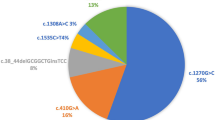Abstract
Biotinidase deficiency is an autosomal recessive metabolic disorder included in many newborn screening programmes. Prior to the introduction of screening for biotinidase deficiency in Sweden in 2002, the disorder was almost unknown, with only one case diagnosed clinically. Biotinidase activity was measured in dried blood spots with a semiquantitative method using biotin-6-amidoquinoline as substrate. The cutoff value was set at 25% (later lowered to 20%) of the mean activity of all samples measured on that day. The disorder was confirmed by quantitative determination of biotinidase activity in plasma and DNA analyses. Over a period of 6 years, 13 patients were identified among 637,452 screened newborns and 5,068 adoptive/immigrant children. None of the patients had clinical symptoms at the time of diagnosis. Six patients had profound biotinidase deficiency, with an activity of 0–5% of normal in plasma. Four of these patients were born to parents who were first cousins of Middle Eastern or African origin. Eighteen gene alterations were identified, nine of which have not previously been described: seven mutations p.L83S (c.248T > C), p.R148H (c.443G > A), p.N202I (c.605A > T), p.I255T (c.764T > C), p.N402S (c.1205A > G), p.L405P (c.1214T > C), p.G445R (c.1333G > A) and two silent mutations p.L71L (c.211C > T) and p.L215L (c.645C > T). The predicted severity of the novel mutations was analyzed by sorting intolerant from tolerant (SIFT) and polymorphism phenotyping (PolyPhen), predicting p.L83S, p.L405P and p.G445R as severe mutations. Due to the high rate of immigrants since 1990 from non-Nordic countries, the incidence of biotinidase deficiency is similar to that found in many other Western countries.
Similar content being viewed by others
Abbreviations
- BD:
-
Biotinidase deficiency
- B6-AQ:
-
Biotin-6-amidoquinoline
- SIFT:
-
Sorting intolerant from tolerant
- PolyPhen:
-
Polymorphism phenotyping
References
Baykal T, Huner G, Sarbat G, Demirkol M (1998) Incidence of biotinidase deficiency in Turkish newborns (letter). Acta Paediatr 87:1102–1103
Baykal T, Gokcay G, Gokdemir Y et al (2005) Asymptomatic adults and older siblings with biotinidase deficiency ascertained by family studies of the index case. J Inherit Metab Dis 28:903–912
Cole H, Reynolds TR, Lockyer JM et al (1994a) Human serum biotinidase: cDNA cloning, sequence, and characterization. J Biol Chem 269:6566–6570
Cole H, Weremowicz S, Morton CC, Wolf B (1994b) Localization of serum biotinidase (BTD) to human chromosome 3 in band p25. Genomics 22:662–663
Elsas LJ, Dembure PP, Langley S et al (1994) A common mutation associated with the Duarte galactosemia allele. Am J Hum Genet 54:1030–1036
Knight HC, Reynolds TR, Meyers GA, Pomponio RJ, Buck GA, Wolf B (1998) Structure of the human biotinidase gene. Mamm Genome 9:327–330
Kumar P, Henikoff S, Ng P (2009) Predicting the effects of coding non-synonymous variants on protein function using the SIFT algorithm. Nat Protoc 4:1073–1081
McVoy JR, Levy HL, Lawler M (1990) Partial biotinidase deficiency: clinical and biochemical features. J Pediatr 116:78–83
Möslinger D, Stockler-Ipsiroglu S, Scheibenreiter S (2001) Clinical and neuropsychological outcome in 33 patients with biotinidase deficiency ascertained by nationwide newborn screening and family studies in Austria. Eur J Pediatr 160:277–282
Norrgard KJ, Pomponio RJ, Swango KL et al (1997) Mutation (Q456H) is the most common cause of profound biotinidase deficiency in children ascertained by newborn screening in the United States. Biochem Mol Med 61:22–27
Norrgard KJ, Pomponio RJ, Hymes J, Wolf B (1999) Mutations causing profound biotinidase deficiency in children ascertained by newborn screening in the United States occur at different frequencies than in symptomatic children. Pediatr Res 46:20–27
Pomponio RJ, Hymes J, Reynolds TR (1997) Mutations in the human biotinidase gene that cause profound biotinidase deficiency in symptomatic children: molecular, biochemical, and clinical analysis. Pediatr Res 42:840–848
Pomponio RJ, Coskun T, Demikol M et al (2000) Novel mutations cause biotinidase deficiency in Turkish children. J Inherit Metab Dis 23:120–128
Ramensky V, Bork P, Sunyaev S (2002) Human non-synonymous SNPs: server and survey. Nucleic Acids Res 30:3892–3900
Sarafoglou K, Bentler K, Gaviglio A (2009) High incidence of profound biotinidase deficiency detected in newborn screening blood spots in the Somalian population in Minnesota. J Inherit Metab Dis Sep 7. [Epub ahead of print]
Swango KL, Demirkol M, Huner G et al (1998) Partial biotinidase deficiency is usually due to the D444H mutation in the biotinidase gene. Hum Genet 102:571–575
Wang L-L, Yong L, Zhou S-F (2009) A bioinformatics approach for the phenotype prediction of nonsynonymous single nucleotide polymorphisms in human cytochromes P450. Drug Metab Dispos 37:977–991
Wastell H, Dale G, Bartlett K (1984) A sensitive fluorimetric rate assay for biotinidase using a new derivative of biotin, biotinyl-6-aminoquinoline. Anal Biochem 140:69–73
Wolf B (1991) Worldwide survey of neonatal screening for biotinidase deficiency. J Inher Metab Dis 14:923–927
Wolf B, Jensen K, Huner G et al (2002) Seventeen novel mutations that cause profound biotinidase deficiency. Mol Genet Metab 77:108–111
Wolf B, Jensen KP, Barshop B (2005) Biotinidase deficiency: novel mutations and their biochemical and clinical correlates. Hum Mutat 25:413
Acknowledgements
The authors thank all patients and parents who kindly provided DNA samples. We also thank Jan Alm, Maria Halldin, Tomas Johansson, Lars Larssson, Bengt Lindblad, Domniki Papadopoulou, Annika Reims, Kenneth Sjöberg and Mikaela Tedner who provided patient data. Without their help, this study would not have been possible. This work was supported by grants from the Karolinska Institute Research Foundation.
Author information
Authors and Affiliations
Corresponding author
Additional information
Communicated by: Matthias Baumgartner
References to electronic databases: Biotinidase deficiency: OMIM 253260. Biotinidase: EC 3.5.1.12. BTD: Biotinidase gene: OMIM 609619. Genbank NM_000060.2.
Competing interest: None declared.
Rights and permissions
About this article
Cite this article
Ohlsson, A., Guthenberg, C., Holme, E. et al. Profound biotinidase deficiency: a rare disease among native Swedes. J Inherit Metab Dis 33 (Suppl 3), 175–180 (2010). https://doi.org/10.1007/s10545-010-9065-y
Received:
Revised:
Accepted:
Published:
Issue Date:
DOI: https://doi.org/10.1007/s10545-010-9065-y




